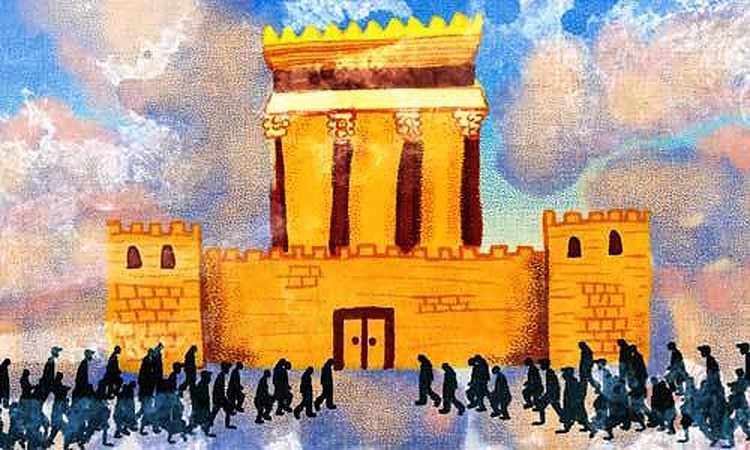Although today marching through the Old City gates is considered a nationalistic and “provocative” act, it has existed as a monthly rite since ancient times.
By Batya Jerenberg, World Israel News
While Jerusalem Day’s Flag March arouses strong emotions in Israel, what many do not realize is that the tradition has ancient roots that have nothing to do with politics.
Walking around the walls of the ancient capital and Temple Mount and stopping to enter each of its gates was a custom established by the Jewish sages a thousand years before there was a single house built beyond the walls. Proof of this was discovered in the famed Cairo Geniza, which stored Jewish writings dating back hundreds of years.
At each of seven gates, special Psalms would be recited, mourning rites over the destruction of the nation’s ancient Temples would be observed, and special prayers would be said for the nation’s spiritual center to be rebuilt. The idea was religious in essence: to ask God for mercy and forgiveness so that the Temple could be re-established and Jewish life return to what it once was.
Jerusalem is mentioned hundreds of times in the Jewish Bible, and it has always played a central role in the Jewish prayerbook.
According to Bar-Ilan University Talmud professor Jeffrey Woolf, the idea was to demonstrate affection for the city.
“There is a very long-standing tradition for hundreds of years, possibly for millennia, of walking around and encountering the various gates of Jerusalem and expressing one’s love for Jerusalem,” Woolf told The Media Line Sunday. “People would come from all over the world on pilgrimage, walk and say prayers at every single gate, and then they would [similarly] walk around the gates of the Temple Mount.”
Jumping to modern times, the custom of walking around the walls was renewed by Israel Prize winner Prof. Zeev Vilnai during the British Mandate, when hundreds would do so specifically on the eve of Tisha B’Av, the date that the two Temples were destroyed hundreds of years apart.
Since the reunification of the capital in 1967’s Six Day War there have been various groups that have taken it upon themselves to encourage people to follow that custom. Since Tisha B’Av is a day of mourning, while many marchers may carry Israeli flags, there is little to no singing and dancing.
That is not the case on the joyous walk around the walls that groups of Jews have been making over the past couple of decades on the eve or first day of each Hebrew month (“Rosh Chodesh”). Their stated purpose is first to express to God the nation’s desire for the Temple to be rebuilt, and second, to put the issue front and center on the public agenda.
The route has almost always included walking through the Muslim Quarter, and is protected by the police.
Since 2018, a small group of ultra-Orthodox men have also circled the Temple Mount every Thursday night at midnight to pray at each one of its gates.
The Flag March on Jerusalem Day has turned into a mass event in recent decades, oftentimes with hundreds of thousands of mostly young, religious people singing and dancing throughout the city while waving large Israeli flags.
While it is a demonstration of joy over the reunification of the heart of the Jewish state, many Arabs and left-wing Jews see it as a provocative, “in your face” demonstration when the youth pass through eastern Jerusalem’s Damascus Gate into the Old City on their way to the Western Wall plaza. In recent years, police and violent Arabs have clashed at the site.
On Sunday morning as well, dozens of Palestinians rioted on the Temple Mount when Jewish groups came up during their regular, limited visiting hours, and at Damascus Gate, with police on the scene trying to restore order.
So far, 8,000 celebrants will be allowed to go through Damascus Gate to the Western Wall, and another 8,000 through the western, Jaffa Gate. This is already a very strict crowd limitation made due to safety concerns, with the main event moved to outside Jaffa Gate instead of the Western Wall.
There is seemingly no escaping the current politicization of Jerusalem Day.
As Woolf pointed out, “In the past year or so Damascus Gate has become this place where anti-Israel, Hamas-sponsored demonstrations have taken place. That puts you in an impossible situation because if you don’t go [through there], it’s as if to say that you’re giving up on part of the city. But if you do then it may lead to inappropriate behavior on the part of the marchers or [violence].”


